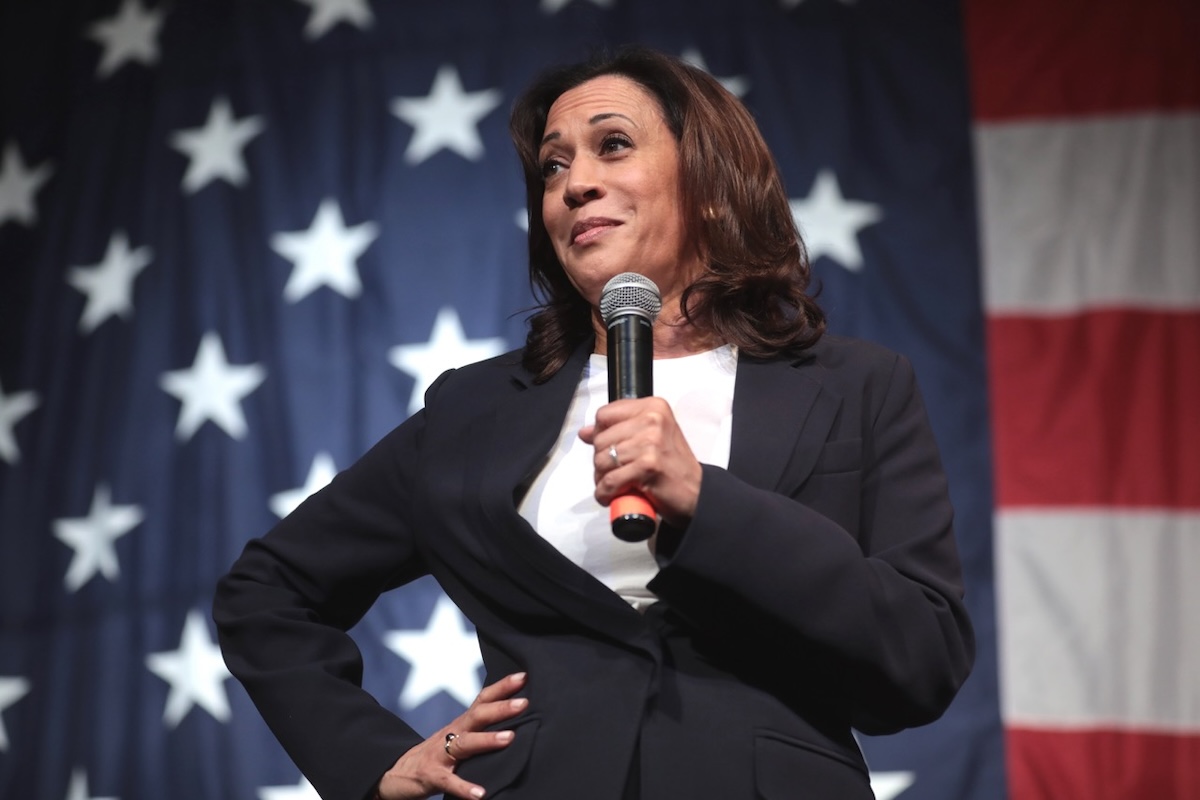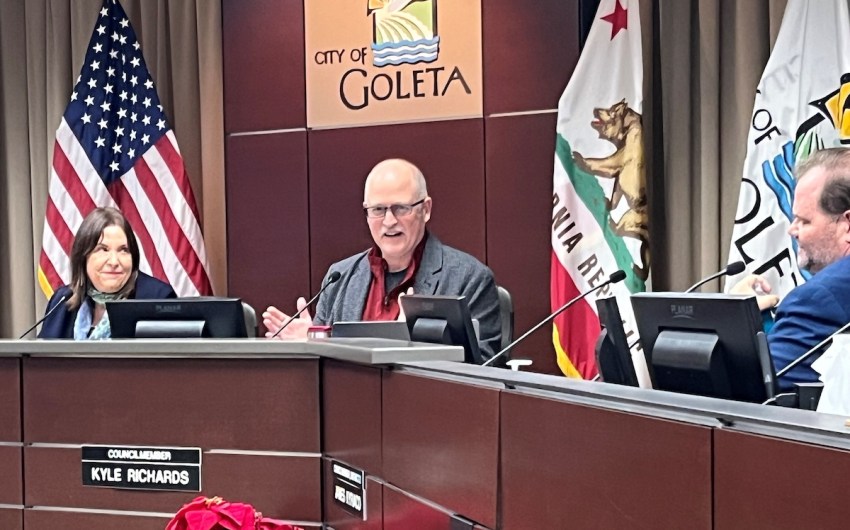One Day to Go: Amid Trump Meltdowns, Shock Poll Shows Women Voters Breaking Huge for Harris
Poll Released over Weekend Reports That Overwhelming Support Among Likely Women Voters Has Given Kamala Harris Lead over Donald Trump in Iowa

This story first appeared at Newsmakers with JR.
Topic A among political junkies, 36 hours before the election: A stunning, high-quality poll, released over the weekend, reported that overwhelming support among likely women voters has given Kamala Harris a lead over Donald Trump in Iowa — wait, what, Iowa?!?
In a ruby-red state where a six-week abortion ban recently took effect, gold-standard pollster Ann Selzer reported in Sunday’s Des Moines Register that Harris holds a 20-point edge among likely women voters over Trump, who leads among men by 14 points. Perhaps more significantly, among women voters registered independent, the Democratic Vice President holds a dominating 28-point advantage over Trump, who leads among independent men by 10 points.
Trump defeated Hillary Clinton by nearly 10 points in Iowa in 2016, and Joe Biden by more than eight in 2020. The Hawkeye State is overwhelmingly white and largely rural, and its entire six-person congressional delegation is Republican.
Selzer enjoys a stellar reputation among the cognoscenti, for her track record of on-the-money surveys that repeatedly confounded conventional wisdom at the time they were released — polling in advance of the Iowa Caucuses, she was the first to detect the surges of Barack Obama and Trump, in 2008 and 2016, respectively, for example.
On Sunday, the Register‘s story on her new poll said that Harris holds a 44-47 percent lead over Trump. In June, the Republican candidate was thrashing President Joe Biden, then the Democrats’ nominee, by 18 points in Iowa; Harris sliced his lead to just four points in September, but the further momentum reflected in the new survey came came as a political shockwave.
Some polling experts argued that is an outlier, but others see it as clear evidence of undecided voters breaking heavily for Harris in the final hours before Election Day.
Dan Pfieffer, a former Obama campaign pollster, explained on social media the basic explanations possible for the poll’s surprising finding:
“Three options here,” he wrote:
- Selzer is right and Harris wins in a massive landslide.
- This poll is just a bad poll (it happens, but it happens to Selzer less than others).
- Harris isn’t really winning IA but the poll is capturing late-stage momentum that bodes well for (the battle ground states of Wisconsin, Michigan, and Pennsylvania)
As a political matter, the poll bolstered a wave of confidence many Democrats have felt since a October 28 Trump rally in Madison Square Garden, which received widespread and mostly negative media coverage; Trump and his campaign were criticized and censured for the hateful tone of the event, and for a series of speakers who delivered racist jokes, not to mention the candidate’s characteristic misogynistic insults of Harris: her intelligence and character.
In the days after, Trump bellowed at one rally that he would be a “protector of women — whether they like it or not” and rhapsodized at another about Never Trump Republican Liz Cheney being shot in the face. Harris, meanwhile, stuck to her familiar themes of unity and the need to turn the page on Trump, while a series of celebrity women surrogates — Beyoncé, Jennifer Lopez, Cardi B, and Michelle Obama among them — delivered powerful, high-profile speeches on her behalf emphasizing the importance of Tuesday’s election to female voters.
In this context, the Iowa poll served as political rocket fuel for Democrats, not so much for the possibility that she will win the state, as for advancing a narrative that the Trump Supreme Court’s Dobbs 2022 decision, throwing out 50 years of settled law about a woman’s right to choose to have an abortion, ignited and is sustaining massive support among women for Harris that could push her to victory in a race already framed by a significant gender split.
Harris’s most direct path to winning runs through the three midwestern battlegrounds of Michigan, Pennsylvania, and Wisconsin; all three are less conservative than Iowa, and the Harris campaign has invested tens of millions of dollars in building an on-the-ground, supporter contact and get-out-the-vote organization that relies heavily on the party’s pro-choice, pro-freedom message.
As Jonathan Martin, Politico’s star senior political columnist, put it on Twitter/X:

The biggest gender gap of all: In the 2024 election, gender and education appear to be more salient factors than age, income, and race as key demographic differences among and between voters, and among the most likely predictors of whom they support for president.
A bipartisan pair of veteran national pollsters and strategists — Democrat Celinda Lake and GOP consultant Amanda Iovino, collaborated on an analysis in the New York Times last week, that examined the matter with more nuance, concluding that the greatest gap in America’s divided politics is between women with a college degree and men without one:
“But broken up by gender and education, we see that the gaps are driven particularly by men without a college degree and women with a college degree, with an overall difference of 43 points.
We are truly looking at two different Americas when we dig into the views of men without college degrees and women with college degrees. They are at opposite ends of the spectrum politically and experience essentially separate economies, and therefore give priority to distinct sets of character traits and issues.”
This chart dramatically tells the story:

Lake and Iovino wrote:
“The story of this election could well be the gender gap between those Americans who went to college and those who didn’t. As the candidates consolidate support among their base, the divide between college-educated women and non-college-educated men seems almost impossible for Ms. Harris or Mr. Trump to overcome. The big question for America going forward is, can these two groups be brought together after a campaign that has only driven them further apart?”
It’s a terrific and important piece. Read the whole thing.
Joe who? If Harris ends up losing the race, she can look back at a cringeworthy comment she made during her October 8 appearance on The View as a red flag data point that reflects a broader political dynamic that’s worked against her throughout the brief campaign.
When the co-hosts asked Harris whether she would have done anything differently as president than Joe Biden, she answered, “Not a thing comes to mind.”
Oy.
Although the answer might earn the vice president points for loyalty among some Democratic insiders, her failure to put distance between herself and a near-historically unpopular president, not only on one talk show, but throughout her 100-day race, has been one of her greatest vulnerabilities.
Right before Biden quit the race on July 21, his job approval rating was deep underwater, according to the Gallup Poll, which found then that only 36 percent of Americans approved of his performance as president, compared with 58 percent who disapproved.
And while Biden’s disastrous debate against Trump the month before, which deepened concerns about his age and apparent mental decline, was the precipitating reason for him withdrawing, it is the low regard for his handling of the economy and immigration that may well have doomed his reelection even if he’d done well in the debate.
Right before Harris replaced him on the ticket, nearly 60 percent of Americans expressed disapproval of him over the economy, and nearly two-thirds expressed unhappiness with him over border policy.
It is common to hear Democrats on the South Coast, and in other blue-voting enclaves across the nation, express astonishment — “How can this race be so close?” — given Trump’s dictatorial designs, first-term record of chaos, and increasingly unhinged public behavior.
But veteran L.A. Times political writer David Lauter put the issue on its head in a smart piece the other day, saying it very well could be Republicans asking how it could be this close, given the kind of sweeping disapproval given to Harris’s boss Biden, and unceasing concern about high prices on groceries, gas, and many other goods and services.
Lauter writes:
“Incumbent parties in wealthy democracies have been thrashed around the world over the last two years.
“Angered by the worldwide bout of inflation that followed the COVID-19 public health emergency, and a huge increase in the number of migrants fleeing war, dictatorships and the impacts of climate change, voters in Europe, Asia and the Americas have turned against their political establishments. That’s been true for parties of the center-left, including Justin Trudeau’s Liberals in Canada, and the center-right, such as Britain’s Conservatives.
“The same forces shape politics in the U.S.“
Lauter quoted a political scientist who studied models used in election forecasts, and discovered a crucial differentiator:
“Those that take polls into account have tended to show a slight edge for Harris. But models that ignore the specific candidates and look only at what political scientists call ‘fundamentals’ — such as the rate of economic growth and voters’ approval of the incumbent president — have generally pointed to a Republican win.
“The takeaway is simple: A normal Republican would be planning a victory party right now.
“Instead, former President Trump is locked in a toss-up race.”
So count your blessings, Democrats. Or something. Read the whole thing.
Premier Events
Sat, Dec 21
11:00 AM
Santa Barbara
Mosaic Makers Market – Holiday Weekend Market
Sun, Dec 22
11:00 AM
Santa Barbara
Mosaic Makers Market – Holiday Market Finale
Wed, Dec 25
6:00 PM
Santa Barbara
FREE Contra Dance X-mas Day💃Corwin & Grace band6-9
Sat, Dec 21
11:00 AM
Santa Barbara
Mosaic Makers Market – Holiday Weekend Market
Sat, Dec 21
12:00 PM
Santa Barbara
Gift Wrapping with Life Chronicles
Sat, Dec 21
2:00 PM
Santa Barbara
State Street Ballet’s 30th Anniversary Production of ‘The Nutcracker’
Sat, Dec 21
4:00 PM
Santa Barbara
Wine + Painting Workshop
Sat, Dec 21
5:00 PM
Santa Barbara
The Rhythm Industrial Complex: Live at Fox Wine Co
Sat, Dec 21
5:00 PM
Santa Barbara
LET IT GLOW Winter Solstice on State St.
Sat, Dec 21
5:15 PM
Santa Barbara
The Longest Night Memorial
Sat, Dec 21
5:30 PM
Santa Barbara
First United Methodist Church Living Nativity
Sat, Dec 21
6:00 PM
Santa Barbara
Captain Fatty’s Ugly Xmas Sweater Party
Sat, Dec 21
6:30 PM
Santa Barbara
Ugly Sweater Singles 30s and 40s Party!
Sat, Dec 21 11:00 AM
Santa Barbara
Mosaic Makers Market – Holiday Weekend Market
Sun, Dec 22 11:00 AM
Santa Barbara
Mosaic Makers Market – Holiday Market Finale
Wed, Dec 25 6:00 PM
Santa Barbara
FREE Contra Dance X-mas Day💃Corwin & Grace band6-9
Sat, Dec 21 11:00 AM
Santa Barbara
Mosaic Makers Market – Holiday Weekend Market
Sat, Dec 21 12:00 PM
Santa Barbara
Gift Wrapping with Life Chronicles
Sat, Dec 21 2:00 PM
Santa Barbara
State Street Ballet’s 30th Anniversary Production of ‘The Nutcracker’
Sat, Dec 21 4:00 PM
Santa Barbara
Wine + Painting Workshop
Sat, Dec 21 5:00 PM
Santa Barbara
The Rhythm Industrial Complex: Live at Fox Wine Co
Sat, Dec 21 5:00 PM
Santa Barbara
LET IT GLOW Winter Solstice on State St.
Sat, Dec 21 5:15 PM
Santa Barbara
The Longest Night Memorial
Sat, Dec 21 5:30 PM
Santa Barbara
First United Methodist Church Living Nativity
Sat, Dec 21 6:00 PM
Santa Barbara
Captain Fatty’s Ugly Xmas Sweater Party
Sat, Dec 21 6:30 PM
Santa Barbara


























You must be logged in to post a comment.